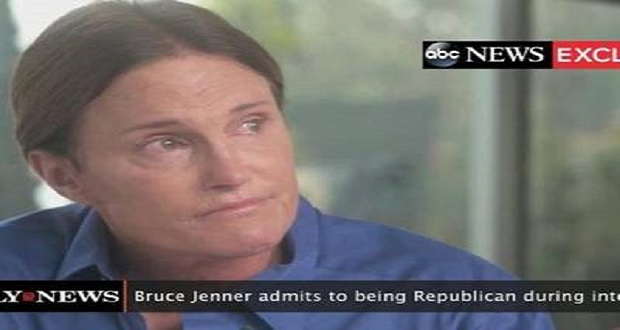
Last week, months of anticipation and speculation finally ended. ABC aired Diane Sawyer’s interview with Olympian and Kardashian-by-proxy Bruce Jenner. During the 20/20 special, Jenner revealed information that shocked and perplexed many of us. Some of us are still left wondering how to process a big detail about Jenner’s life. His big disclosure, of course, was that he is a Republican.
Oh, and by the way, Jenner also said that he really feels like a she and is in the process of transitioning to a new gender. But that wasn’t the most eye-opening detail for me. Rather, it was that a celebrity like Jenner would identify as a Republican. Yes, of course, he (Jenner continues to use male identifiers to refer to himself) is hardly the only Republican in Hollywood, but every time a famous figure comes out as anything other than liberal, I am jarred.
I should know better than to stereotype and assume that every actor, singer, and reality star will vote for Hillary in 2016. I do know better! And yet…
I was disappointed to discover that Jenner is—gasp!—a Republican, mainly because I’m not one. Nonetheless, I’ll get over my disenchantment. Besides, Jenner, a burgeoning champion of equal rights for the transgender community, is more than just his politics.
Unfortunately, not everyone can see past one’s political affiliation. Race used to be “the deepest divide in American society,” wrote Dana Milbank in The Washington Post. No more. “Americans now discriminate more on the basis of party than on race, gender or any of the other divides we typically think of—and that discrimination extends beyond politics into personal relationships and non-political behaviors. Americans increasingly live in neighborhoods with like-minded partisans, marry fellow partisans and disapprove of their children marrying mates from the other party, and they are more likely to choose partners based on partisanship than physical or personality attributes.”
Indeed, a recent study by Stanford and Princeton researchers found not only that “the level of partisan animus in the American public exceeds racial hostility” but that we are increasingly accepting of hatred thrown at the opposition. In other words, we don’t just tolerate but practically revel in the notion that it’s perfectly OK for liberals and conservatives to insult each other as “knuckle-dragging Neanderthals,” “traitors,” and bleeping bleeps that should go bleep themselves.
While social norms prevent most of us from insulting people of different races, genders, and religions similarly, we seem incapable of restraining ourselves when it comes to using political beliefs to malign and humiliate.
But now get this: “This hyper-partisanship has occurred even though fewer people identify with the actual parties,” Milbank points out.
I think the larger issue is that too many of us are colorblind. We cannot—or rather, simply refuse to—see gray. Everything is black or it’s white. A political party is good or it’s bad. And if you don’t agree with me, you’re obviously bad.
We all need to take more time to recognize that people share more commonalities than differences. Plus, we should spend less time attacking each other as people and more time debating ideas.
After all, if I can accept that Jenner is a Republican, than anything in this world is possible.


















